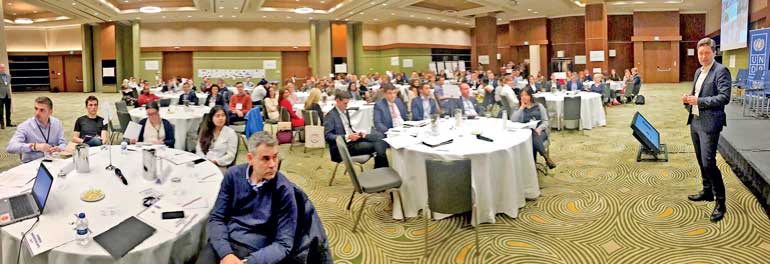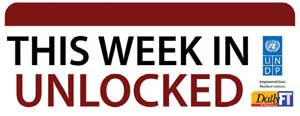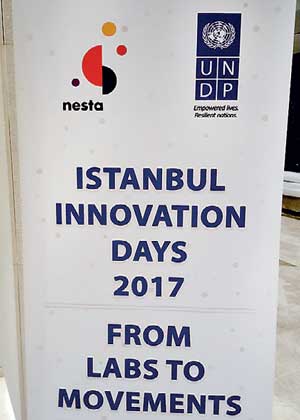Monday Feb 16, 2026
Monday Feb 16, 2026
Thursday, 23 November 2017 00:00 - - {{hitsCtrl.values.hits}}

By Deshani Senanayake
A total of 150 participants, 50 countries, 40 organisations across UNDP country offices worldwide, government partners, and private sector innovation facilities from across the globe. This was the makeup of the participants at the Istanbul Innovation Days (IID) organised by the UNDP Regional Bureau for Europe and the Commonwealth of Independent States in Istanbul, Nesta, and McKinsey.
For three days from 31 October to 2 November, I had the privilege of being privy to engaging discussions amongst gatherings of innovation giants within all sectors across the board working in all corners of the world trying to re-evaluate and re-imagine what human development should look like, and identifying the role of innovation in the new architecture that is needed to re-design development solutions which cater to the requirements of our ever-changing times.
This year, IID focused on two related topics; first being the increasing emergence of a new way of developing policy solutions through the establishment of public sector innovation labs. The latest trends in applying and incorporating social innovation into the makeup of public sector processes, and subsequently, those results and barriers were explored further through sessions on the need for developing projects into impactful movements which could in turn leverage public sector innovation for large scale change. 
The insider experience from colleagues in innovation labs within the public sector that have already been established in some countries, such as Bangladesh, Armenia and Moldova, were invaluable as they shared success stories of factors which helped their work, as well as efforts which didn’t see the light of day – bringing to life the phrase I heard used the most in innovation circles, ‘it is okay to fail as long as you fail quickly, and cheaply’.
Alternatively, the other topic discussed at IID was the changing paradigm in knowledge management; with a clear shift away from creating knowledge ‘just in case’ to producing ‘actionable information just in time’. Through this segment, deliberations identified various approaches of incorporating knowledge management into the regular functions of everyday work in order to strengthen the subsequent development initiatives.
Put in simpler terms, work out loud as we go along in order to share information and experiences on a daily basis which could, in turn, feedback into our everyday processes and programmes to make them that much more effective and efficient, and able to create more impactful results.
What are some roadblocks? 
Working in the development sector, while we focus on developing solutions under large frameworks which try to take every factor into consideration, it just might be that our focus is too much on ensuring that we’re incorporating all the aspects of the latest trends, and not paying enough attention to the most crucial one: the people whose lives we aim to change.
During one of the discussions, a participant made the point that we, as development practitioners, need to take a step back and focus on the impact our work has on the people we work for, instead of losing our focus in the other louder variables. This comment caused a deep silence in a room filled with chatter only moments ago, and became embedded in my mind to be one of the most important guiding forces of my work henceforth.
Another hindrance to using the knowledge we create effectively is the lack of structures and processes in practice to incorporate this knowledge back into the programmes we develop. Ideally, the knowledge we get from the experience of implementing projects should be fed back into the next project cycle so that we can make changes to the project accordingly to the results achieved from the previous time. Unfortunately, this is not always the case.
Where do we go from here?
But, as innovators are known to do, the participants at IID came up with many innovative and creative ways of moving forward utilising the knowledge development practitioners created to garner the most impact.
One of the main lessons was shared by the great Dave Snowden, a world-renowned researcher in knowledge management, who stressed the importance of individuals sharing their own stories, and the need for us to move away from creating centralised information repositories. Snowden reiterated that knowledge management should be done to “share stories, not to learn facts”.
In the coming future, this would mean designated communication and knowledge management roles would be redundant as it would be more effective if everyone in the development sector shared their own stories, and made alterations to their own work as they identified the needs accordingly. Another innovative approach which could change how knowledge management is looked at is the use of technology to work more collaboratively, and in a more efficient manner. A resource person from McKinsey shared the experience of developing a platform titled ‘Know Now’, similar to YouTube, for their internal purposes where everyone in the organisation would make a brief video about a topic of their expertise and upload it so that it could help others with similar bottlenecks in their work.
Though initially not too popular, once they were able to get senior colleagues creating videos that were causal yet informative, the trend had picked up, thus, proving that effective knowledge management could create wider impact even in our day-to-day activities.
Colleagues from Microsoft were also present to share tips on how best to utilise all the applications already in existence through their online platforms to work in real-time with multiple people across time zones in order to be more effective and efficient.
Overall, IID was an interesting eye-opener which emphasised the need to allow people to share their own stories in order to become the change they need to create in order to stay effective, but also relevant in today’s world.
The sentiment succinctly put forth by Indy Johar, a resource person from OO Studios, “building intelligence and awareness in all actors in (any given) network is what will create sustainable development”, sums up this need to use the knowledge UNDP creates effectively in our projects in order to remain the preferred development partner to governments across the globe.
(The writer is an undergraduate from Cornell College with a background in International Relations, Gender Studies, and Psychology. Passionate about working towards an inclusive future, with a focus on empowered young women, she is currently working at UNDP in the Youth and Innovation cluster.)
(Disclaimer: UNLOCKED is a space for Sri Lankan youth to express their views and opinions on development with the aim of creating positive change in the world. The views expressed in the blogs are solely those of the authors. UNDP Sri Lanka and Daily FT does not represent or endorse the views expressed in these blogs. Read more about the UNLOCKED initiative www.lk.undp.org.)